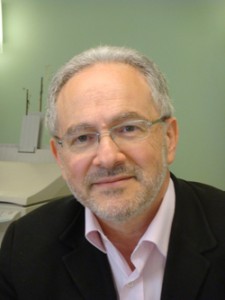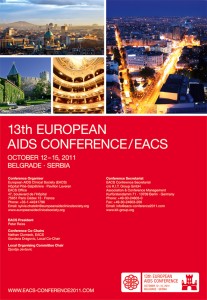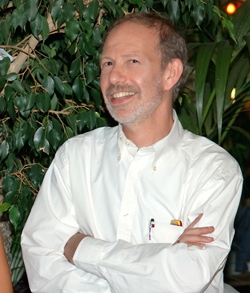On 12th October 2011, in Belgrade, Serbia, the 13th European AIDS Conference / EACS, with expected number of 3,500 delegates, will bring together leading HIV clinician and researchers from Europe and the world to discuss latest results and findings in the field of HIV medicine.
The European AIDS Conference, with over 3,500 participants from all over the world’s largest and most important medical-scientific conference in Europe. The majority of European doctors and scientists, the presentation and discussion of current research in the field of HIV medicine, and the required intensive exchange between scientists, clinicians and representatives of affected groups, will make this important conference.
The European AIDS Clinical Society (EACS) is a not-for-profit group of European physicians, clinicians and researchers in the field of HIV/ AIDS.
Established in 1991, it aims to bring together scientists from all over Europe to help exchange the latest medical and scientific knowledge regarding clinical aspects of HIV/AIDS and its complications. The Society is currently chaired by Prof. Peter Reiss from the Netherlands with Prof. Manuel Battegay from Switzerland as Vice President.
The main activities of the Society are: organisation of the European AIDS Conference, issuing treatment guidelines and education and training of HIV-physicians.
Every 2 years EACS hosts a European conference held in a major European city.
Previous Conferences was held in: Cologne – 2009, Madrid – 2007, Dublin – 2005, Warsaw – 2003, Athens – 2001, Lisbon – 1999, Hamburg – 1997, Copenhagen – 1995, Milan – 1994, Paris – 1992
 In 2011 the conference will be held in Belgrade, Serbia. On this occasion, we had honour to speak with Prof. Dr Peter Reiss, EACS President and Prof. Dr Nathan Clumeck, EACS Conference Co-Chair.
In 2011 the conference will be held in Belgrade, Serbia. On this occasion, we had honour to speak with Prof. Dr Peter Reiss, EACS President and Prof. Dr Nathan Clumeck, EACS Conference Co-Chair.
1. The HIV pandemic is one with the greatest challenges in medicine. Could we highlight some main topic on the coming 13th AIDS Conference?
It’s really hard to single out any particular topic which will feature at the Conference. EACS always tries to have the conference program reflect the whole range of topics which are important in the clinical management of persons living with HIV.
These of course include advances in antiretroviral therapy, in the management of complications of HIV and its treatment including in patients getting older, issues around viral hepatitis coinfection, as well as HIV in pregnancy and children.
This year we shall also include discussions of the use of HIV therapy for prevention and discussions on the possible emergence of neurocognitive disorders in our succesfully treated patients. Finally, as EACS attempts to do at each biannual Conference, we shall highlight the most recent changes in the EACS guidelines for the management of persons living with HIV.
2. There is still large number of infected people in Europe who know nothing about their infection. What are possible initiatives for solving this problem?
Indeed the fact that many people are not aware of being HIV infected is a problem both in Europe and globally. No single measure can be expected to solve this problem.
The optimal mix of measures is likely going to be different depending on the characteristics of the epidemic (e.g is the epidemic generalized or mainly occurring in certain risk groups; what is the regional prevalence of HIV etc? ) in a particular country or region.
Measures which may be considered could range from annual testing and linking to treatment and care of those identified as HIV positive, targetting either whole populations or particular groups at high risk.
Another ancillary option which is being considered, including in Europe, is to increase testing by the medical community when persons present with medical conditions which have an increased likelihood of being associated with HIV (so-called indicator diseases) (more information about the latter can be found at www.hiveurope.eu ).
The Conference in its opening session will feature a lecture by Professor Sir Roy Anderson which is likely to address many aspects of this topic.
 3. What do You expect from coming AIDS conference? What are the main goals?
3. What do You expect from coming AIDS conference? What are the main goals?
An important goal once again is for the Conference to provide a platform for scientists, practitioners as well as representatives from the community of persons living with HIV to come together and be educated on, and discuss recent advances as well as dilemmas in the management of persons living with HIV.
Another goal is that we always hope that by bringing the Conference to a particular city, it will provide an opportunity to raise awareness for issues concerning HIV both in the host city, the host country and the region.
4. What city of Belgrade have, that was the most important for You, to be host of this significant conference?
The city of Belgrade was selected as Conference venue based on the strong bid the local scientific leadership (Drs Djordje Jevtovic and Gordana Dragovic) made to want to host the meeting.
In addition, the EACS leadership felt it was appropriate to try and bring the Conference once again to one of the Eastern parts of Europe, following the highly succesful meeting in Warsaw in 2003 and the three intervening meetings in three different cities in the more Western part of Europe.







































 Srpski
Srpski English
English